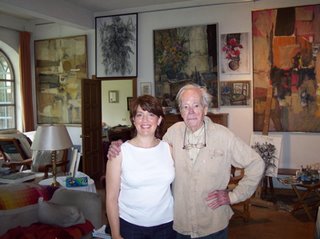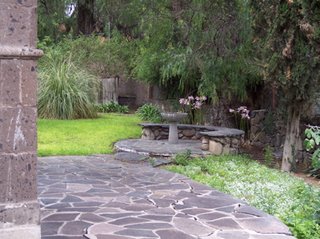 A great deal has transpired in the last 24 hours. I've had interviews with a centenarian, a world renouned artist, thirty-something retirees, and had lunch with the "Unchanging Nature of Men" group, a true cross section of the San Miguel de Allende (SMA) expatriate community. Although I promise highlights form each, I'm going to talk about SMA's history as an artists' colony from the mid-1940s to the present. This morning I had the pleasure of talking with Leonard Brooks, perhaps the best-known artist that SMA has produced (or nurtured).
A great deal has transpired in the last 24 hours. I've had interviews with a centenarian, a world renouned artist, thirty-something retirees, and had lunch with the "Unchanging Nature of Men" group, a true cross section of the San Miguel de Allende (SMA) expatriate community. Although I promise highlights form each, I'm going to talk about SMA's history as an artists' colony from the mid-1940s to the present. This morning I had the pleasure of talking with Leonard Brooks, perhaps the best-known artist that SMA has produced (or nurtured).I met with Leonard Brooks at his home this morning (photo of the grounds below) at the suggestion of another informant. I knew of Leonard and Reva Brooks, of course, because of Jack Virtue's biography of their lives and work in SMA. I would have never dreamed of calling on Mr. Brooks, however, simply because he seemed too remote for a project like my own. However, I did call yesterday afternoon. His sister-in-law answered the phone (she's a delightful woman) and made an appointment to visit this morning.
 Mr. Brooks is nearly 95 years old. He lives in a house that is about half a mile from the central jardín, a lovely walled complex of about an acre with two structures: his studio and a lovely home and garden. Like so many of the first generation San Miguelian expatriates, he looks remarkably fit and has an incredible memory. He still works everyday, has written two books in the last year, and is planning an exhibit of his watercolor collection for later this year in Mexico City.
Mr. Brooks is nearly 95 years old. He lives in a house that is about half a mile from the central jardín, a lovely walled complex of about an acre with two structures: his studio and a lovely home and garden. Like so many of the first generation San Miguelian expatriates, he looks remarkably fit and has an incredible memory. He still works everyday, has written two books in the last year, and is planning an exhibit of his watercolor collection for later this year in Mexico City.Leonard Brooks was an early arrival to SMA. He came shortly after he was discharged from the service (World War II). He was looking for a place to "get away from the war" and concentrate on his work. When he and his wife Riva found SMA "by accident" in 1947, there were some 15 American or Canadian expatriates living here. They had come, he recalled, because they were affected by the war and felt unwelcome in their home societies. Like the other GIs, Brooks lived on his army pension and found a small house on a hill overlooking SMA. There was no water, no electricity and no gas service to the house, but he nevertheless found it the perfect place to paint.
His house is overflowing with his artwork and photographs for which his late wife, Reva Brooks, is well known. As we talked about the charming nature of this community, Brooks noted that like his peers, he is not overly enthusiastic about the transformation SMA has undergone in the last decade. The wealthy investors have made the community unaffordable for upcoming artists, and the proliferation of art galleries in the city makes it possible for mediocre artists to join exhibit in a town where once only the most-established professional artists were featured.
Brooks stands apart from other people I've talked to here in that he sees himself, and his peers, as responsible for the changes in SMA. When I asked him why SMA transformed into place where the very wealthy seek to buy seasonal homes he said, "Well, it's our fault, the artists and painters. I painted San Miguel, and we all wrote about how wonderful it was here. In a sense, we've sullied our own nest." At the same time, he is not nostalgic for the SMA of the past, because he recognizes that all places change and transform. He mentioned a former mining town about an hour's drive from here that is now attracting young artists. Like SMA, it has an old-world charm, but not the mystique of this community.
Overall, I found Leonard Brooks to be kind and thoughtful, and I appreciated my time with him very much. Right before I left, he showed me around the house and his studio, where he rarely paints now. Instead his living room has become his studio, and there was a beautiful painting of San Miguel as he remembers it from the late 1940s. It is sparse painting showing several young men and their burros moving through the streets as evening falls. There are no cars, no large homes, and no crowded streets. It is a peaceful memory of this community as it once was, and was magnificent to behold.
No comments:
Post a Comment